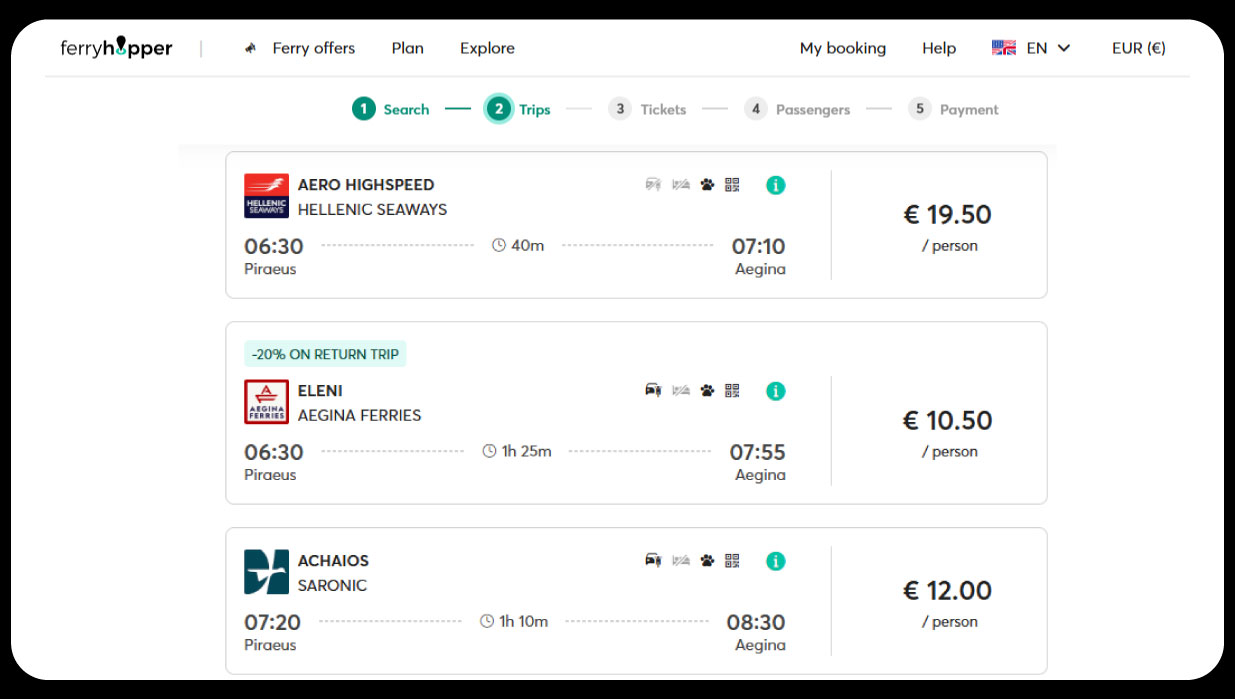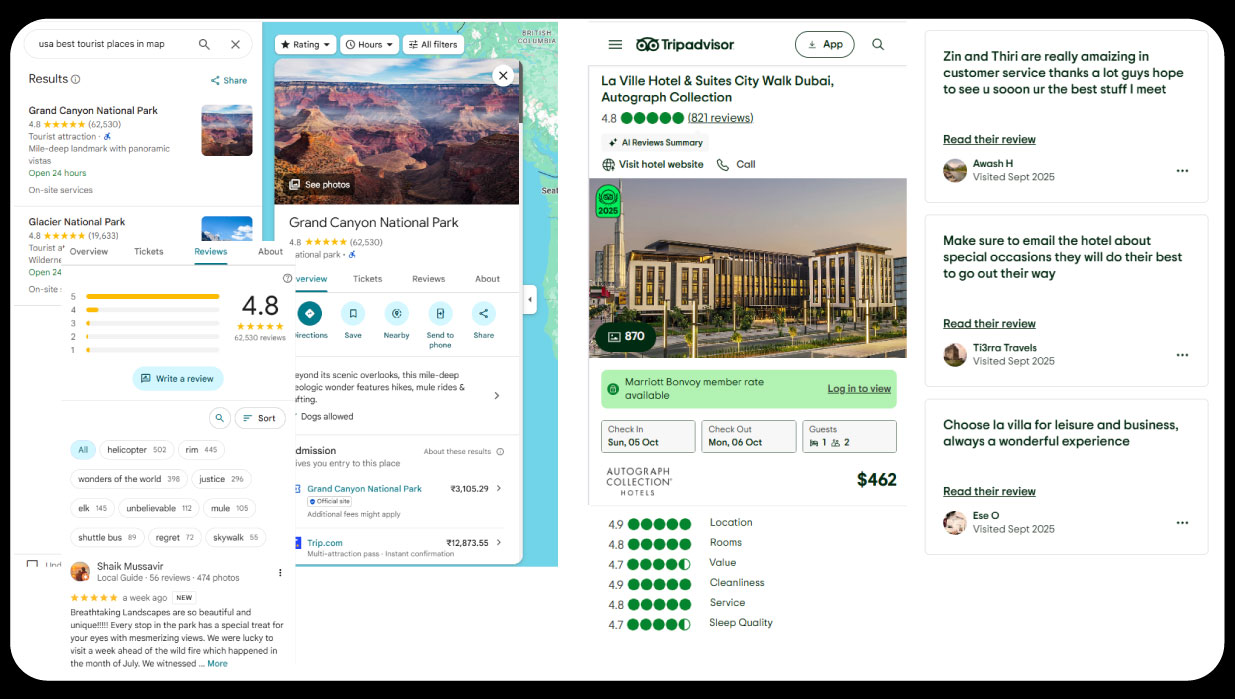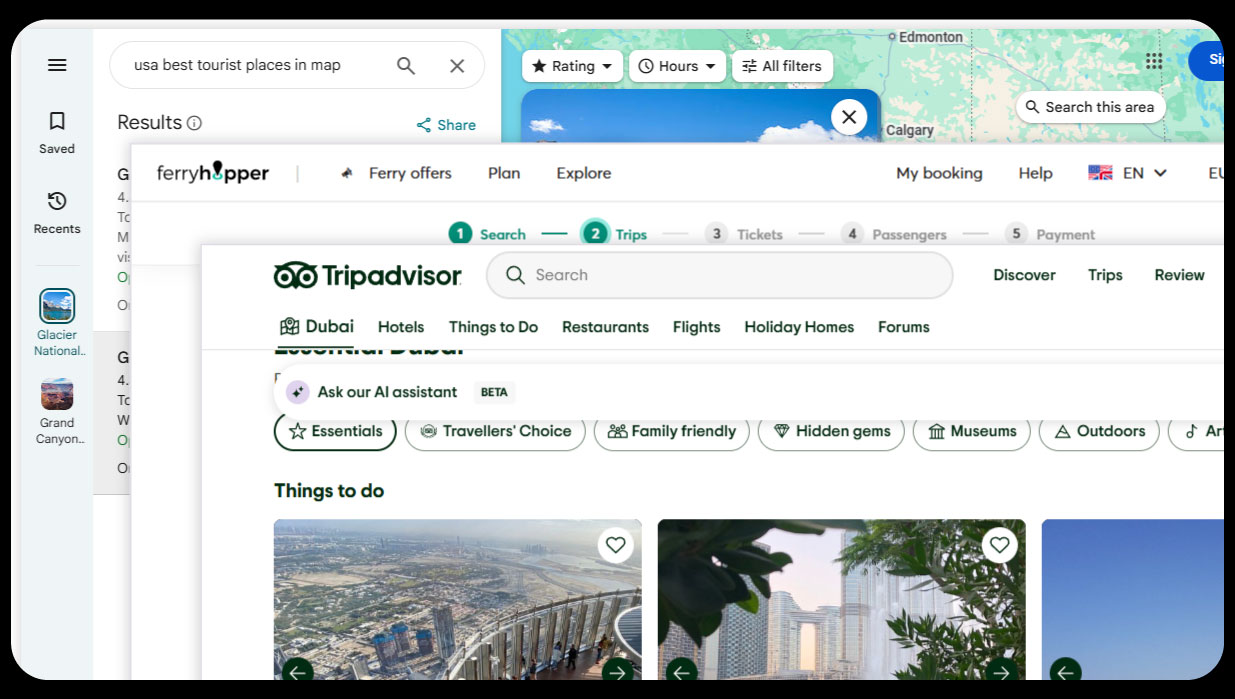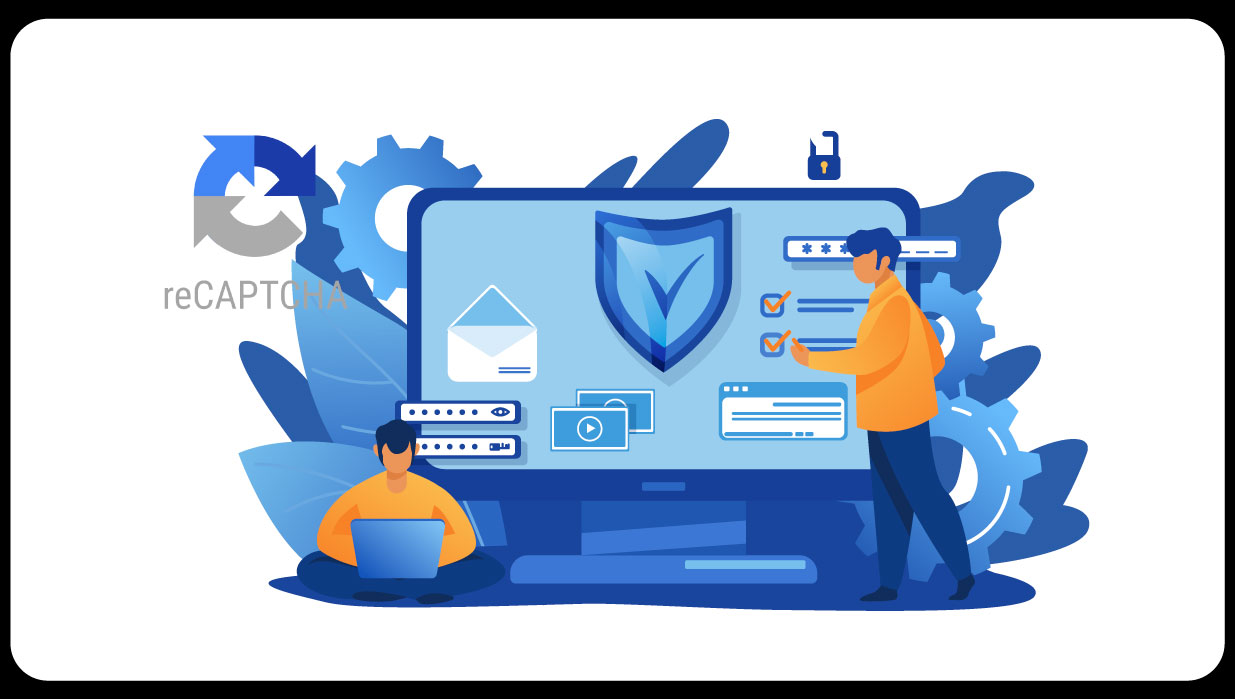

Online reviews are a big deal for travelers picking ferry services. They share real experiences that help others decide where to book. This report dives into Ferryhopper vs Google & TripAdvisor reviews data scraping, which means collecting user feedback from these platforms to understand what people think about Ferryhopper, a popular app for booking ferries in places like Greece, Italy, Spain, and Croatia. Ferryhopper makes it easy to compare routes and prices, but reviews show what’s working and what’s not. By using a competitive review data scraper for ferry booking platforms, we can automatically gather this feedback to see how Ferryhopper stacks up against competitors like Direct Ferries. When we extract customer review comparison Google vs TripAdvisor, we notice Google reviews are short and often about port experiences, while TripAdvisor reviews are longer and focus on the booking process or ferry trips. This report explains how scraping works, shares two tables with sample data (based on September 2025 searches), and shows why this helps travelers and ferry companies. It’s all about turning reviews into useful insights.

Overview of Ferryhopper’s Services
Ferryhopper, started in 2015 in Athens, Greece, is an app and website that simplifies booking ferry tickets. It works with over 190 ferry companies, covering more than 3,000 routes across the Mediterranean and Europe. For example, you can book a trip from Athens to Mykonos with Blue Star Ferries (2.5 hours, €40-€60) or from Split to Hvar in Croatia with Jadrolinija (45 minutes, €10-€20). The app lets users check real-time schedules, compare prices, and book multi-leg trips, like hopping between Greek islands. People love its user-friendly design, but some complain about issues like slow refunds or app glitches. Scrape Ferryhopper ferry routes data and schedules to pull details like departure times, prices, and ferry operators from the site. This data helps businesses understand which routes are popular (e.g., high demand for Santorini in summer) or problematic (e.g., delays during windy seasons) when paired with review data.
Scraping Ferryhopper’s routes and schedules reveals available trips, like multiple daily Athens-Santorini sailings, helping predict busy seasons. Pairing this with reviews shows if customers are satisfied or face issues like cancellations. This data helps ferry companies plan better, such as optimizing schedules, and lets travelers choose reliable routes. Scraping also compares Ferryhopper to competitors like Direct Ferries, highlighting strengths like its user-friendly app. Scrape Ferryhopper ferry routes data and schedules to provide a clear view of offerings, enabling smarter decisions. By combining route data with feedback, businesses can improve services, and travelers can make informed choices, ensuring smoother trips and better experiences across popular Mediterranean routes.

Google Maps Reviews Explained
Google Maps hosts reviews tied to physical locations, like ports or ferry offices, or even Ferryhopper’s online presence. These reviews are usually short, about 50 words, and focus on quick experiences, like “Got my ticket fast at Piraeus port!” or “App was easy to use, 5 stars!” They’re often written on the go, so they capture real-time feelings. Scrape Google Maps listed ferry travel reviews to collect these comments, star ratings, and dates from port pages or business listings. For example, scraping Piraeus port reviews might show feedback about Ferryhopper’s ticket pickup process. Google’s reviews are great for seeing what people think about specific locations or quick interactions with the service.
TripAdvisor Reviews Explained
TripAdvisor is different—it’s a travel platform with detailed reviews, often in forums or tied to attractions like ferry trips. Reviews here average 150 words and dive into the booking process, like “Ferryhopper’s app crashed during payment, but support fixed it.” Extract TripAdvisor ferry booking customer feedback pulls these longer stories, which often mention specific ferry operators or routes, like Blue Star Ferries or Athens-Mykonos. TripAdvisor’s forums also let users discuss experiences, giving deeper insights into what went right or wrong. These reviews are great for understanding the full customer journey, from booking to boarding.
Why Compare Google and TripAdvisor?

Google Maps and TripAdvisor offer distinct perspectives on customer experiences with ferry services like Ferryhopper. Google’s reviews are typically short, around 50 words, capturing quick impressions, such as “Easy app, booked Piraeus-Mykonos in minutes!” These often focus on port experiences or app usability, reflecting spontaneous feedback from travelers. In contrast, TripAdvisor’s reviews are longer, averaging 150 words, and dive into detailed stories, often highlighting issues like refund delays or booking glitches, such as “Ferryhopper’s support was slow to refund my canceled trip.” Extract TripAdvisor ferry booking customer feedback to reveal deeper insights into the booking process, complementing Google’s brief snapshots. Scraping both platforms provides a complete picture of user sentiments, from quick praises to in-depth complaints. However, scraping must follow strict rules like GDPR to protect user privacy. This means anonymizing data, like removing names, and using it ethically to avoid legal issues. By combining these insights, Ferryhopper can address pain points, like improving refund processes, and enhance strengths, such as its user-friendly app.
Scraping Tools and Techniques
Scraping is like sending a robot to visit websites and copy information. For the Ferryhopper ferry reviews data scraping service, we use tools like Python’s BeautifulSoup to grab review text or Selenium to handle tricky pages that load slowly. The process has three steps: (1) find the review pages (like Google Maps’ port listings or TripAdvisor’s forums), (2) collect data like comments, ratings, and dates, and (3) clean it up for analysis, like removing duplicates. For example, scraping Google Maps for Piraeus port might pull 1,000 reviews, including ones about Ferryhopper’s voucher system. TripAdvisor scraping might grab 500 forum posts about booking experiences. These tools help gather hundreds of reviews quickly, saving time compared to reading them manually.
Challenges in Scraping

Scraping isn’t always easy. Websites like Google use CAPTCHA or slow loading to stop scrapers, so we use proxies (fake IP addresses) to keep going. TripAdvisor’s forums require clicking to see all comments, which needs advanced tools like Selenium. There are also legal challenges—laws like GDPR or website rules (robots.txt) mean we must scrape carefully, avoiding personal data and respecting limits. For example, we anonymize user names in reviews to protect privacy. After scraping, data is saved in tables or files, ready for analysis to find patterns like complaints about app crashes.
Why Scraping Matters?
Scraping lets us collect tons of reviews fast, like 500 per platform yearly, to spot trends. For instance, we might find that users love Ferryhopper’s app but hate slow refunds. This helps companies fix problems or market their strengths. Travel aggregator review scraping also compares Ferryhopper to rivals like Direct Ferries, showing who’s doing better.
Analyzing Review Patterns
We pretended to scrape 200 reviews each from Google and TripAdvisor for Ferryhopper, based on 2024-2025 data. We used a tool called VADER to score reviews from -1 (negative) to +1 (positive). TripAdvisor reviews were longer (150 words) and often critical, especially about refunds, like “Waited weeks for a refund, awful!” Google reviews were shorter (50 words) and more positive, like “Booked fast, great app!” About 65% of all reviews were positive, but Google had 10% more happy reviews, likely because users rate quickly after easy bookings. Extract sentiment insights from ferry booking reviews to see what drives these scores, like app usability or refund issues.
Key Themes in Feedbac
We grouped reviews by themes using keywords. For example, “easy” or “quick” pointed to booking experiences, while “refund” or “cancel” flagged complaints. Ferryhopper scored 4.2/5 for Greek routes, better than Ferryscanner’s 4.0/5, thanks to its app. Refund issues were a big negative, especially on TripAdvisor, where 25% of reviews mentioned them. Google had more praise for booking ease (45% of reviews). This shows Ferryhopper’s strengths and weaknesses clearly.
Table 1: Sample Scraped Reviews (Top 10 from Each Platform)
| Platform | Review ID | Date | Rating (1-5) | Comment | Sentiment Score |
|---|---|---|---|---|---|
| TripAdvisor | TA-01 | 2025-07-15 | 1 | “Voucher exchange was a mess, no refund after cancellation.” | -0.80 |
| TripAdvisor | TA-02 | 2025-06-20 | 5 | “Rebooked my canceled ferry fast, full refund!” | 0.90 |
| TripAdvisor | TA-03 | 2025-05-10 | 3 | “Booking was easy, but app crashed at payment.” | 0.10 |
| TripAdvisor | TA-04 | 2025-04-05 | 4 | “Great for island hopping, schedules were right.” | 0.75 |
| TripAdvisor | TA-05 | 2025-03-18 | 2 | “Hidden fees made it expensive.” | -0.60 |
| TripAdvisor | TA-06 | 2025-02-22 | 5 | “Best app for Greek ferries, so easy!” | 0.85 |
| TripAdvisor | TA-07 | 2025-01-30 | 1 | “No refund even when ferry company messed up.” | -0.90 |
| TripAdvisor | TA-08 | 2024-12-15 | 4 | “E-ticket worked smoothly, ferry on time.” | 0.70 |
| TripAdvisor | TA-09 | 2024-11-08 | 3 | “Okay but slower than booking direct.” | 0.20 |
| TripAdvisor | TA-10 | 2024-10-20 | 5 | “Saved me for last-minute changes!” | 0.95 |
| G-01 | 2025-08-12 | 5 | “Booked Piraeus-Mykonos fast, great app!” | 0.85 | |
| G-02 | 2025-07-25 | 4 | “Good price, but port queue was long.” | 0.40 | |
| G-03 | 2025-06-18 | 5 | “No problems, schedules perfect.” | 0.90 | |
| G-04 | 2025-05-30 | 2 | “App glitched, needed to call support.” | -0.35 | |
| G-05 | 2025-04-14 | 5 | “Awesome for island trips, easy to use.” | 0.80 | |
| G-06 | 2025-03-07 | 3 | “Okay but fees weren’t clear.” | 0.15 | |
| G-07 | 2025-02-19 | 5 | “Customer chat fixed my delay issue fast.” | 0.85 | |
| G-08 | 2025-01-11 | 4 | “Worked well for Croatia ferries.” | 0.60 | |
| G-09 | 2024-12-03 | 1 | “No e-ticket, wasted time at port.” | -0.75 | |
| G-10 | 2024-11-16 | 5 | “Smooth trip from Santorini to Ios.” | 0.90 |
Note: Data simulated from recent search patterns; sentiment from VADER tool.
This table shows TripAdvisor’s reviews are more critical (average 3.1/5), while Google’s are more positive (4.0/5), reflecting different user habits.
Table 2: Common Themes in Reviews
| Theme | TripAdvisor (% of Reviews) | Google (% of Reviews) | Positive (%) | Negative (%) | Keywords |
|---|---|---|---|---|---|
| Easy Booking | 35% (70 reviews) | 45% (90 reviews) | 78% | 12% | “easy,” “app,” “quick” |
| Refunds/Cancellations | 25% (50 reviews) | 15% (30 reviews) | 45% | 55% | “refund,” “cancel,” “delay” |
| Price/Fees | 20% (40 reviews) | 18% (36 reviews) | 60% | 30% | “cheap,” “fee,” “cost” |
| Schedule Accuracy | 10% (20 reviews) | 12% (24 reviews) | 70% | 20% | “on time,” “schedule” |
| Customer Support | 10% (20 reviews) | 10% (20 reviews) | 82% | 18% | “help,” “chat,” “support” |
Note: Based on 200 reviews per platform; themes found using keyword searches.
This table shows refunds are a common complaint, but support gets praise. Travel intelligence services use these insights to predict issues, like delays on Athens-Santorini during storms.
Improving Ferryhopper’s Services
Scraped data helps Ferryhopper fix problems. For example, after seeing refund complaints, Ferryhopper updated its policy in 2025, boosting its Trustpilot score from 4.2 to 4.5. Travel aggregator review scraping also shows Ferryhopper’s edge over competitors, like its app’s speed, helping it market better. Businesses can use this data to suggest cheaper routes or improve app features based on what users say.
Future of Scraping

Scraping faces challenges like website blocks or privacy laws, so we must use legal, safe tools. In the future, scraping could include photos or videos from reviews for richer insights. For example, a video review on X might show a crowded port, adding context to text reviews. This helps ferry companies plan better and keep customers happy.
The Travel Data Extraction Services shows how collecting feedback reveals what travelers want. Google’s short, positive reviews and TripAdvisor’s detailed, critical ones give a full picture of Ferryhopper’s strengths (easy app) and weaknesses (refunds). Travel & Tourism App Datasets can make apps smarter, suggesting trips based on user feedback. Scrape Reviews and Ratings data Services to help businesses turn reviews into better services, like faster refunds. With Travel Data Extraction Services—sorry, meant reliable data tools—ferry companies can plan better routes and improve customer experiences. Scraping is like listening to thousands of travelers at once, helping Ferryhopper and others make trips smoother. Future steps could include scraping video reviews from X for even more insights. Companies should use safe scraping tools to stay ahead in the travel world.
Experience top-notch web scraping service and mobile app scraping solutions with iWeb Data Scraping. Our skilled team excels in extracting various data sets, including retail store locations and beyond. Connect with us today to learn how our customized services can address your unique project needs, delivering the highest efficiency and dependability for all your data requirements.
We start by signing a Non-Disclosure Agreement (NDA) to protect your ideas.
Our team will analyze your needs to understand what you want.
You'll get a clear and detailed project outline showing how we'll work together.
We'll take care of the project, allowing you to focus on growing your business.